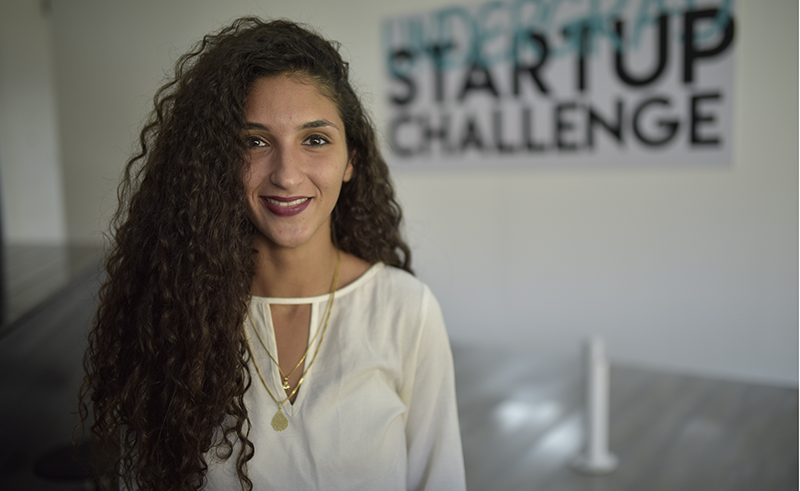Cairo Angels' Powerhouse Menna Abdel Rahman Reveals How to Approach an Investor - and Strike a Deal
Since its launch in 2012 by Hossam Allam, Cairo Angels has invested over $2.2 million in 21 startups across 6 cities in Egypt and the MENA. We talk to its young bosslady, Menna Abdelrahman, about the unspoken strategy every entrepreneur wants to learn: how to approach your first mentor.

The country's first formal network of angel investors, Cairo Angels connects local startups with seed funding from investors in its community - a diverse pool of key ecosystem players that has been steadily growing in the past years. This year alone, the network invested in instant-delivery app Bosta, on-demand babysitting and tutoring platform Orcas, and Elves, a personal helper app.
Having much earlier identified the missing component of early-stage investment in the local startup scene in Egypt, Cairo Angels connects angel investors to young business founders. Today, the community has nearly 50 active angels - totalling an average of four investments yearly - investors from the Egyptian diaspora across the world, and a standalone chapter in London.
Menna Abdelrahman, its young, sharp and incredibly driven General Manager, is frequently in the startup scene's spotlight. Working alongside Chairman Aly El Shalakany, she is now steering an impactful network of investors supporting the flourishing MENA startup scene. Over the past three years, the 25-year-old woman has been heavily involved in supporting entrepreneurs across the ecosystem, and has been invited as a panel member in pitching competitions including Arabnet, Betapitch Cairo, and our very own Undergrad Startup Challenge.
"Angel investing is not just about money," she says. "If the startup has active angels, they organically provide mentorship, access to networks and support with both human and social capital, in addition to the financial capital they invest. Ultimately, the mindset is that the support from the angel needs to go all the way, because a startup’s success leads to the investor’s success as well," she begins, introducing us to the world of angel investment in the Egyptian landscape. So we cut to the chase and delve into the investor-entrepreneur relationship, from A to Z.
Let's talk about the question on every aspiring entrepreneur's mind. What are the possible ways to approach an investor?
When approaching an investor, as a startup you first have to identify what you need, what funding stage you are at, and what type of funding you are looking for, as different types of businesses require different types of funding. An entrepreneur can't go raise funding and assume you are having the financial partner come in and that's it; funding comes with much more than that.

Cairo Angels' General Manager Menna Abdel Rahman as part of the jury at MO4 Good's Undergrad Startup Challenge.
You should ask yourself where do you need to go and what do you need to do to get there? Are you familiar with what raising money entails? Investment comes with a level of maturity into the startup, where you have advisors, perhaps a board of directors, there is reporting to do and you, and a more careful tracking your KPIs. It's also crucial to be at the right stage, as some entrepreneurs try to raise money too early, while some others would actually need larger rounds.
An entrepreneur can't go raise funding and assume you are having the financial partner come in and that's it; funding comes with much more than that.
So there is a checklist?
It varies; it’s not a hard checklist, but there are some key things we look for in investment opportunities. We would want a startup with an existing full-time team of founders - so it’s not just an idea and one person is doing all the work. There has to be a concise problem to solve with an innovative solution, and a scalable business model that is close to commercialisation; they need to be raising between $25,000 to $120,000; they would need to have a ready prototype, a proof of concept and preferably some market validation. This is where we come in, and this is where it could make sense for us investors to fund that first leg of growth in the market.
Sometimes, we see someone with a really cool product or service, but they operate in a vacuum and don’t fit within the context of what the market looks like, or the players. We’re investing in the growth of the company, so we’d need to see what they are using the investment for - what we call “use of funds - and how long the money will last them - the “runway.”
We look at startups pre and post-revenue; some companies might have had significant traction before they monetise and can prove that there is demand; another company might be selling a very cool service to a very small niche and are looking to scale their user base.
Once the entrepreneur has these aspects figured, how can they actually come and knock on your door?
There are multiple ways. We receive applications all year round; either through the website - which has just been relaunched - or social media. We also receive referrals from investors and actively look for startups that are exciting.
So, in terms of what comes with the investment, do you give startups mentorship?
We focus on investments; but startups that receive investment from us would naturally receive mentorship and guidance from the investors themselves. But generally, when thinking about mentorship, you should always ask why you would want a mentor. There are different scenarios; people can sometimes mistake needing mentorship with needing specific expertise within the team, which can be added with a new team member. In other cases, you might need someone from the same industry to give you technical advice, while other entrepreneurs need someone who is more experienced to be a sounding board.
It's simply a matter of continuity, where mentors are more involved, and you build a relationship with people and businesses.

Abdel Rahman says that approaching a mentor "is really about being a go-getter and having something to capture their attention."
So in terms of looking for mentors, do you build a relationship by just going and talking to them?
This is a really difficult part of the market; it’s a network. If someone is not good at that or does not have access; if they are outside of the ecosystem, it is rather difficult. It’s a matter of accessibility; don’t be afraid to approach people that could be potential mentors, but go in the mindset that you are building a relationship; that you have something to offer them; an interesting opportunity that they can support and grow in. Some mentors would want to be engaged with new markets, a smart entrepreneurs, as they learn from these interactions as well.
Don’t be afraid to approach people that could be potential mentors, but go in the mindset that you are building a relationship; that you have something to offer them.
So how does this work? What is the process for an investor to decide on a startup? Do you recommend specific startups to the investor?
Each investor, whether a fund, a network, or an individual, will have their own investment thesis - they have a set of guidelines that they draw for themselves, which helps them decide on what to invest and what not to. These areas may include stage, the amount of money they put in, the sector, and in certain cases they even narrow that further to technologies within a specific sector.
At Cairo Angels, we follow our criteria to screen and vet investment opportunities; we then select an average of three startups to pitch at an investor meeting, which takes place six times a year, and before they pitch, we train them on how to pitch and guide them to prepare the deck. It’s important for startups to know that pitching privately to investors is different than pitching at big competitions. It’s more than just the story you tell; there are lots of details, figures, and strategy that has to be delivered. These pitches don’t guarantee an investment, but rather sparking an investor’s interest and continuing conversations on potential investment.
So what happens when you receive interest from investors?
As we are an angel network, we have multiple investors that co-invest with one another to make up the total amount a startup is raising. The due diligence - in other words, digging deeper - and term negotiation are facilitated by our team until potentially a deal is closed and an investment is made. And that’s not the end of the process! It’s like a marriage; there comes a lot of reporting after, a positive interaction between the investor and the entrepreneur where they support each other. Ultimately, the goal is strong growth for the company and achieving its next milestones.
To our investors, we recommend to build a portfolio of companies, which means they make small investments in a number of companies (nearly 10 over a few years); this helps manage the very high fail rate of startups and helps them get a good return on investment. But in the end, angel investing is one of the most high-risk forms of investment.
What is the range of investments that Cairo Angels carry out?
Between $25,000 to $120,000. We also provide access to the wider investment network, so we can syndicate with investment partners outside the Cairo Angels network for larger rounds, including local, regional and corporate VCs.
How is Cairo Angels making money?
Through our membership fees. To become a member of Cairo Angels, you pay a membership to get access to our pipeline and co-invest with other angels. Members also get access to a variety of entrepreneurship events, and investment trainings. We recently had a series of workshops lead by Nelson Gray, a Scottish renowned angel with 20 years experience on angel investing. We also host a series of high-impact cozy discussions called Community Talks which discuss entrepreneur and investor pain points with key ecosystem players.
Photos by @MO4Network.
Photographer: Ahmed Najeeb.
Interview: Valentina Primo.
For more info about Cairo Angels, check out their website and Facebook page.
- Previous Article Bassita: Click Funding for a Better Egypt
- Next Article How to Validate Your Idea, According to Middle Eastern Investors




















